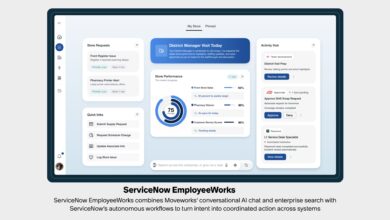The Next Frontier for Agentic AI is Multi-Agent Collaboration

Reem Jafar Alattas, the Sr. Tech Director at Globant, says, the optimal level of autonomy for Agentic AI is a carefully calibrated balance, leveraging AI’s efficiency while maintaining human oversight for critical functions
How do you define Agentic AI, and how does it fundamentally differ from traditional chatbots or rule-based automation?
At Globant, we define Agentic AI as intelligent systems designed to autonomously pursue goals, make decisions, and interact with their environment to achieve complex objectives, often without constant human intervention. This fundamentally transcends traditional chatbots and rule-based automation in several critical ways:
- Goal-Driven & Proactive: Unlike traditional chatbots that respond to pre-defined queries within a limited conversational scope, Agentic AI is given a high-level goal and then proactively plans and executes multi-step actions to achieve it. It’s not just reactive; it initiates processes.
- Autonomy & Adaptability: Rule-based automation follows rigid, explicit instructions and fails outside those boundaries. Agentic AI, as seen in our AI Pods, is designed to operate autonomously on specialized tasks, adapting its approach based on real-time feedback and environmental changes. Our Globant Enterprise AI (GEAI) platform allows for the creation of these agents without coding, enabling rapid iteration and adaptation.
- Complex Problem Solving: Chatbots and rule-based systems struggle with ambiguity or problems requiring iterative problem-solving and dynamic decision-making. Agentic AIs, on the other hand, can reason, plan, and often break down complex problems into manageable sub-tasks, as highlighted by our AI Agents for the Software Development Life Cycle (SDLC), which redefine how we build software by accelerating delivery and improving accuracy at every stage.
- Learning & Continuous Improvement: While some traditional systems have basic learning, Agentic AI is built for continuous learning. Our strategy ensures that “AI Pods adapt to emerging technologies, maintaining a culture of ongoing learning,” constantly enhancing their performance based on outcomes and human supervision. In essence, Agentic AI shifts from executing pre-defined tasks to achieving desired outcomes through intelligent, adaptive, and often iterative processes.
Beyond task automation, what complex, multi-step problems are agentic AIs uniquely positioned to solve that current AI models cannot?
Agentic AIs are uniquely positioned to address complex, multi-step problems that demand dynamic orchestration, continuous optimization, and decision-making across varied data sources and domains. These are problems where traditional AI models, limited by their static training or reactive nature, fall short:
- End-to-End Software Development & Maintenance: Our Globant CODA suite exemplifies this. Agentic AI can transform design sessions into comprehensive game design documents (“Game Design Document Agent”), analyze audio/video for product definition, generate user stories, automate code fixes (“Code Fixer AI Agent”), and bring AI to the core of testing strategies, turning requirements into automated test cases and validating UI against designs (“Test Agentic Capabilities”). This encompasses the entire SDLC, integrating multiple functions seamlessly.
- Comprehensive Financial Management & Optimization: Agents like the “CFO Copilot Agent” manage end-to-end processes from natural language understanding to curated queries for financial information. An “Investor AI” agent can analyze a financial portfolio, evaluate investment options based on current market data, and help make informed decisions. These roles require complex data analysis, reasoning, and multi-stage execution.
- Streamlined Human Resources Operations: The “HR Inquiry Agent” supports HR activities like managing licenses, vacations, and reimbursements by analyzing attached documents, making the entire process more efficient and accurate, covering multiple steps from inquiry to resolution and document processing.
- Industry-Specific Operational Optimization: Beyond generic tasks, Agentic AI tackles domain-specific challenges. The “Drilling Support Agent” optimizes drilling operations by analyzing real-time data to improve efficiency, reduce costs, and ensure safety in the Electricity, Oil, and Gas sectors. This requires continuous data processing and adaptive decision-making within a specialized industrial context.
These examples highlight how Agentic AI excels in scenarios requiring iterative reasoning, coordination of various sub-tasks, and dynamic adaptation to achieve a larger, complex objective that spans multiple traditional functional boundaries.
How much autonomy should Agentic AI have in decision-making, and where should humans remain in the loop?
The optimal level of autonomy for Agentic AI is a carefully calibrated balance, leveraging AI’s efficiency while maintaining human oversight for critical functions. At Globant, our approach is defined by “AI Agents + Supervision.”
- Autonomy for Defined, Repetitive Tasks: Agentic AIs, particularly those deployed within AI Pods, are empowered to work “autonomously on specialized tasks.” This includes automating repetitive processes in development, design, testing, and maintenance, maximizing efficiency and allowing human Globers to focus on innovation.
- Human-in-the-Loop for Validation, Correction, and Strategic Alignment: Despite their autonomy, our model emphasizes that “Globers validate, correct, and enhance agent outputs to guarantee quality and security.” The AI Pods offer access to agentic AI orchestrated and supervised by Globant experts to ensure strategic alignment, quality, and traceability.
- Decision Validation: For high-impact or ambiguous decisions, humans remain in the loop to review and approve the agent’s proposed actions or outputs, ensuring they align with strategic goals and ethical considerations.
- Continuous Learning & Refinement: Human Globers provide crucial feedback, correcting agent errors and guiding their learning, as part of our “Focus on People” strategy which includes “an exclusive training program in Globant University Campus to grow professionally in an AI-driven culture.”
- Strategic Direction & Context: Humans set the overarching goals, define constraints, and provide the nuanced business context that agents might not fully grasp. This is reinforced by our subscription model’s “Clear metrics around consumption and performance,” enabling human oversight of AI Pod effectiveness.
- Risk Mitigation: Human supervision ensures that AI operations adhere to legal, compliance, and ethical standards, minimizing risks associated with fully autonomous decision-making in sensitive areas.
This hybrid approach ensures that AI Pods deliver “smarter, scalable solutions, with faster time to market and lower costs,” while maintaining the critical human touch for quality, accountability, and strategic insight.
What’s the next frontier for Agentic AI—will we see AI “agents” collaborating like human teams?
The next frontier for Agentic AI is unequivocally multi-agent collaboration, where AI “agents” will function much like human teams, orchestrating their efforts to achieve complex, shared objectives. Our Globant Enterprise AI (GEAI) platform, with its “meta-agent Iris,” is designed precisely to orchestrate and manage specialized AI agents, enabling dynamic task assignment, workflow management, and collective learning. This paves the way for seamless human-agent teams, amplifying human productivity and creativity exponentially.
This vision of collaborative, autonomous agents is not just theoretical; it’s fundamental to how we are reinventing our services and revenue model through AI Pods. AI Pods are our disruptive subscription model for AI-powered services, like engineering, product definition, design, and testing at scale. This is where the innovation of Agentic AI meets a groundbreaking business model.
Instead of traditional hourly rates or fixed projects, clients subscribe monthly to an AI Pod, gaining access to agentic AI that is “orchestrated and supervised by Globant experts.” This ensures quality, traceability, and strategic alignment, while leveraging the power of specialized agents working together. The revenue model is consumption-based, typically using a “token-based metered capacity,” aligning our costs directly with the value and outcomes delivered.
We offer diverse commercial models, including “Result/Outcome-Based” (tying our revenue to client success metrics), “Fixed-Flow,” “Subscribed Consumption,” and “Mixed Pricing,” all designed to provide transparency and flexibility. This revolutionary approach, powered by agentic capabilities, allows us to deliver smarter, scalable solutions with faster time to market and lower costs, marking a radical departure in our industry by offering services as continuous, intelligent software.
Will open-source models keep pace with proprietary Agentic AI systems, or will there be a widening gap?
I anticipate a dynamic interplay of convergence and specialization. Open-source models will continue to drive innovation and democratize AI capabilities, with our AI Pods being “AI model-agnostic” to leverage top-performing LLMs from various sources. However, proprietary Agentic AI systems, like Globant Enterprise AI (GEAI), will likely maintain an advantage in providing integrated orchestration, robust governance, enterprise-grade security, and deep industry-specific customization necessary for reliable, scalable deployment within complex business environments. The gap will be in operationalization and specialized value delivery.




